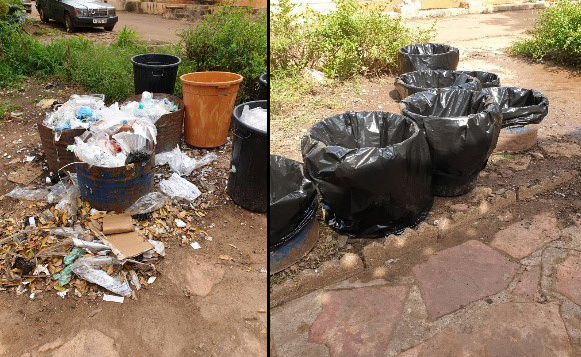Helping Those Protecting Us Against COVID-19: Cleaners, Ambulance Drivers, and Morgue Attendants Receive IPC Training in Mali
To read this story in French, please click here.
Because they are on the frontline fighting COVID-19, health professionals take dramatic measures to protect themselves and their community from infection risks. However, as the 2019 Ebola epidemic demonstrated, they are not the only ones that need to take on this responsibility—cleaners, ambulance drivers, and morgue attendants also have an important role to play. Unfortunately, this population is often overlooked when it comes to capacity-building activities because they don’t receive the required training to do their work efficiently.
In Mali, an infection prevention and control (IPC) assessment done in 12 health facilities in August 2020 showed some weaknesses in IPC for these groups. Mr. Bakary Niaré, for example, a cleaner at the university hospital of Point G in Bamako indicates that “we all agree that we were not cleaning correctly. Toilets were dirty and no triage was done for waste.” This observation is also shared by Mr. Fousseyni Diawara, paramedic at the Centre de Santé de Référence (CSRef) of Koutiala, a town located 390 km east from Bamako: “During evacuations, health workers often throw used pads and band aids on the ground. […] We would also bring our work clothes back home to wash (which can lead to infecting other people in the house).” This lack of knowledge of IPC measures by these individuals can lead to high infection risks and antimicrobial resistance (AMR) for all staff, patients, and the community.
To solve this issue, the USAID Medicines, Technologies, and Pharmaceutical Services (MTaPS) Program provided technical support to the Direction Général de la Santé et de l’Hygiène Publique (DGSHP), the Agence Nationale d’Evaluation des Hôpitaux (ANEH), and the Institut National de Santé Publique (INSP) as well as four hospitals (Point G, Mère-Enfant Luxembourg, Mali, and dermatology of Bamako) to adapt the IPC training modules developed by MTaPS for these target audiences and to train them. This activity was implemented with WHO, World Vision, Terres des Hommes, the International Committee of the Red Cross, Intra Health, and HRH2030 and was part of the COVID-19 response strategy implemented by MTaPS in the country; 12 training sessions were done during 3 days and targeted 170 people. The trainings were followed by a post-session supervision in the same health facilities to see how well the modules and the guidance provided were followed.
The supervision session showed a strong involvement of stakeholders. Mr. Niaré and Mr. Diawara both share this feeling of involvement, praising the work of all stakeholders and saying that they have already put in place the guidelines provided during the training. In the University Hospital Point G, the team has promised to repair the toilets in the emergency room, regularly clean the units and toilets, and improve waste management with appropriate garbage bags. Both workers hope that the number of trainings can be increased to give all their colleagues the opportunity to benefit from them.
For Mr. Sory Ibrahim Bouaré, IPC Focal Point for WHO in Bamako, “these trainings are some of the most important ones for several reasons. These target audiences are often forgotten during capacity-building activities while they are one of the groups on the forefront of infection prevention by cleaning surfaces, [being involved in] logistics, transport, and working in morgues. Some people have been working for 20 years and have never been trained, this is one of the weaknesses of the system that needs to be fixed. With the COVID-19 pandemic, tools and modules have already been developed (for health workers). I would like to advocate so that cleaners, ambulance drivers, and morgue attendants can be trained in all health facilities.”

Cleaning and waste disposal before (left) and after (right) training. Photo credit: Dr. Madina Kouyaté, IPC/COVID-19 consultant